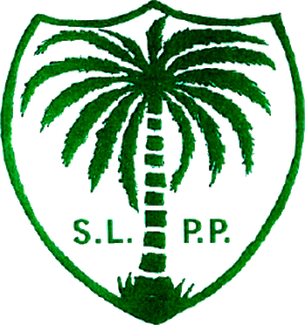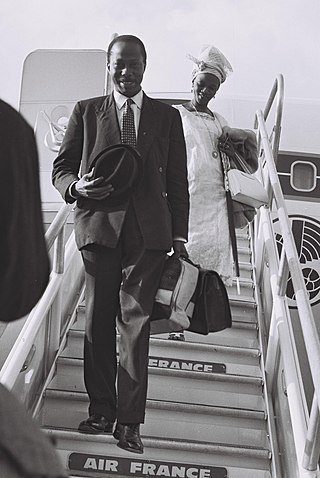
Sierra Leone, officially the Republic of Sierra Leone, is a country on the southwest coast of West Africa. It shares its southeastern border with Liberia, and the northern half of the nation is surrounded by Guinea. Covering a total area of 71,740 km2 (27,699 sq mi), Sierra Leone has a tropical climate, with diverse environments ranging from savanna to rainforests. The country has a population of 7,092,113 as of the 2015 census. Freetown is the capital and largest city. The country is divided into five administrative regions, which are subdivided into 16 districts.
Sierra Leone first became inhabited by indigenous African peoples at least 2,500 years ago. The Limba were the first tribe known to inhabit Sierra Leone. The dense tropical rainforest partially isolated the region from other West African cultures, and it became a refuge for peoples escaping violence and jihads. Sierra Leone was named by Portuguese explorer Pedro de Sintra, who mapped the region in 1462. The Freetown estuary provided a good natural harbour for ships to shelter and replenish drinking water, and gained more international attention as coastal and trans-Atlantic trade supplanted trans-Saharan trade.

The Republic of Sierra Leone Armed Forces are the armed forces of Sierra Leone, responsible for the territorial security of Sierra Leone's borders and defending the national interests of Sierra Leone, within the framework of the 1991 Sierra Leone Constitution and International laws. The armed forces were formed after independence in 1961, on the basis of elements of the former British Royal West African Frontier Force, then present in the Sierra Leone Colony and Protectorate.

The Sierra Leone People's Party (SLPP) is one of the two major political parties in Sierra Leone, along with its main political rival the All People's Congress (APC). It has been the ruling party in Sierra Leone since 4 April 2018. The SLPP dominated Sierra Leone's politics from its foundation in 1951 to 1967, when it lost the 1967 parliamentary election to the APC, led by Siaka Stevens. Originally a centre-right, conservative party, it identifies since 2012 as a centre-left social democratic party, with a centrist tendency.

Siaka Probyn Stevens was the leader of Sierra Leone from 1967 to 1985, serving as Prime Minister from 1967 to 1971 and as President from 1971 to 1985. Stevens' leadership was often characterized by patrimonial rule and self-indulgence, consolidating power by means of corruption and exploitation.

Major General Joseph Saidu Momoh, OOR, OBE was a Sierra Leonean politician and military officer who served as the second President of Sierra Leone from November 1985 to 29 April 1992.

Brigadier David Lansana was the first prominent Sierra Leonean in the Sierra Leone Military during the colonial era. After Sierra Leone gained independence, he served as Military Attaché to the United States.
Sir Albert Michael Margai was the second prime minister of Sierra Leone and the half-brother of Sir Milton Margai, the country's first Prime Minister. He was also the father of Sierra Leonean politician Charles Margai.
Brigadier John Amadu Bangura, CBE was a Sierra Leonean who served as Chief of the Defence Staff of the Sierra Leone Armed Forces from 1968 to 1970. Prior to this in 1967, he served as the Sierra Leonean Ambassador of to the United States. He was the acting Governor-General of Sierra Leone from 18 April 1968 until 22 April 1968. He led the Sergeants' Coup in 1968 that successfully re-instated civilian rule in Sierra Leone.

Sorie Ibrahim Koroma commonly known as S.I. Koroma was a Sierra Leonean politician, labor activist, and one of the founding members of the All People's Congress political party. He served as first Vice President of Sierra Leone from April 19, 1971, to retirement on November 28, 1985, under president Siaka Stevens.
Francis Misheck Minah was a Sierra Leonean statesman, lawyer and politician who served as First Vice President of Sierra Leone from 1985 to 1987 under President Siaka Stevens. An ethnic Mende from the Pujehun District, he became a member of the House of Representatives in 1967. He had previously served as Minister of Foreign Affairs, Minister of Health, Minister of Trade and Industry and Attorney General and Minister of Justice.

Komeh Gulama Lansana was the wife of Brigadier David Lansana, Force Commander of the Sierra Leone Army until his execution in 1975.

General elections were held in Sierra Leone on 17 March 1967. They were won by the opposition All People's Congress, marking the first time that a ruling party had lost an election in sub-Saharan Africa. However, the APC was overthrown in a military coup hours after taking power. The party was later restored to office after a counter-coup the following year and established a long-standing dictatorship.

In April 1961, Sierra Leone became politically independent of Great Britain. It retained a parliamentary system of government and was a member of the British Commonwealth of Nations. The Sierra Leone People's Party (SLPP), led by Sir Milton Margai were victorious in the first general election under universal adult franchise in May 1962. Upon Sir Milton's death in 1964, his half-brother, Sir Albert Margai, succeeded him as Prime Minister. Sir Albert attempted to establish a one-party state had the ready cooperation of the opposition All People' Congress but met fierce resistance from some cadre within his party Sierra Leone People's Party (SLPP) and ultimately abandoned the idea.

The Dominion of Sierra Leone was an independent sovereign state with Queen Elizabeth II as its head of state between independence on 27 April 1961 and becoming the Republic of Sierra Leone on 19 April 1971.
Adesanya Kwamina Hyde 1968 New Year Honours C.B.E. was a Sierra Leonean ambassador to the United States of America.

The Constitution of Sierra Leone is the supreme law governing Sierra Leone and delineates its frame of government. It entered into force on October 1, 1991, following a popular referendum and approval by President Joseph Momoh. It superseded the 1978 Constitution.

This is a list of heads of government of Sierra Leone, from the establishment of the office of Chief Minister in 1954 until the present day. The office of Prime Minister was abolished after the constitutional referendum in 1978, and reinstated in as Chief Minister.
The Sergeants' Coup was a military coup d'état in Sierra Leone that occurred on 18 April 1968 against Chairman of the National Reformation Council (NRC) and acting Governor-General of Sierra Leone Brigadier Andrew Juxon-Smith, who declared himself the interim leader the year prior. The coup opened way for a 24-year-long All People's Congress dictatorship.